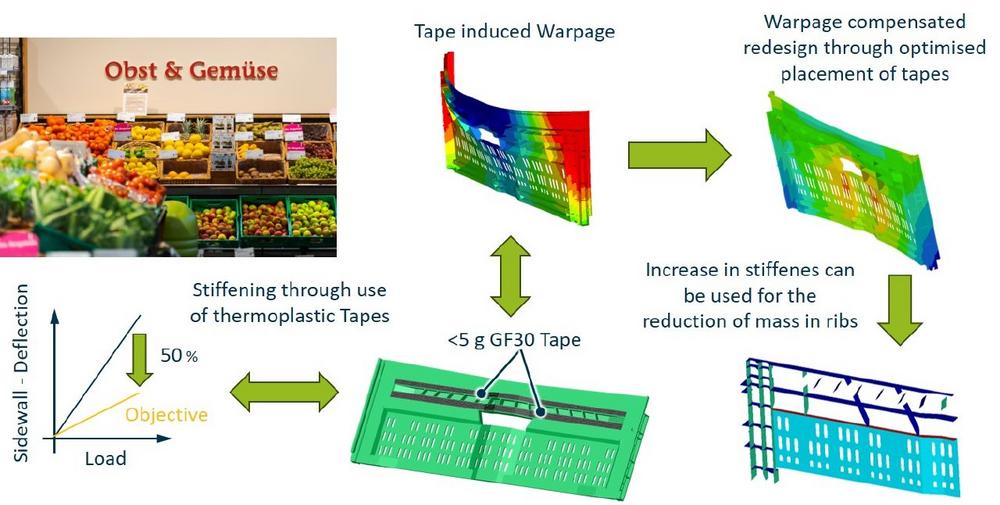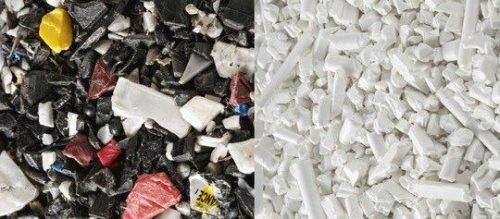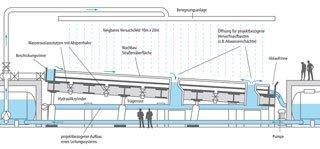
Lightweight construction – Efficient use of UD tapes in injection-moulded parts
Thermoplastic composite materials such as unidirectional tapes and composite sheet are being increasingly used above all in aerospace and the automotive industry because of their high potential for the production of composite parts with increased stiffness and strength. These materials, especially UD tapes, are also being increasingly used in cost-conscious and high-volume industries to reduce material consumption, costs and CO2 emissions.
It had already been shown that the local reinforcement of an injection-moulded component through a small quantity of UD tape can be utilised to reduce wall thicknesses and save material. In practice, however, the use of only a small quantity of thin UD tapes to increase the properties of an injection-moulded part has not yet become established. This is because, on the one hand, the potential of this process is not yet adequately known, and on the other, the practical implementation of this technology has not yet been adequately researched.
In an earlier study in cooperation with 20 industry partners, the IKV and AZL (Aachen Center for Integrative Lightweight Production), research institutes carried out a detailed analysis of the use of UD tapes in injection-moulded components. The aim of the study was to identify potential applications and to extend the range of use beyond the high-performance application, especially in areas in which cost reduction is of central importance.
In the consortium project "Tape Technology Transfer Hub" (T³-Hub), IKV is now investigating, together with the AZL, AZL Aachen GmbH, AVK-TV GmbH, SIMCON kunststofftechnische Software GmbH and Conbility GmbH, how the tape technology for conventional injection-moulded parts can be transferred to large-scale production in order to be able to optimally exploit the cost-saving effects. The research project has been running since December 2021 and is funded by the BMWK (German Federal Ministry for Economic Affairs and Climate Action).
Within this project, methodologies for evaluating the potential and for the re-design of components are being developed. Apart from that, questions will be examined concerning the entire value-added chain: from tape production through insert production to back-moulding. In parallel with the practical implementation and investigation, a complete data chain will be built up in the consortium, and the process mapped at simulative level.
Simulative method for the optimisation of reinforced injection-moulded parts with thermoplastic tapes
As a project partner, IKV developed an optimisation methodology for the re-design of injection-moulded parts according to the particular load case and using local tape inserts. In injection moulding, the considerable differences in stiffness and thermal expansion coefficients between the tapes and the compound often lead to significant warpage. As part of this project, IKV therefore developed an optimisation algorithm that enables the automated design of such components without leading to warpage. At the same time, the mechanical design targets were taken into account. The key here is to utilise the induced warpage in the tape structure to balance out the warpage in the other tapes (Figure 1).
IKV’s optimisation algorithm was successfully used to redesign the side wall of a reusable folding box. These folding boxes are used worldwide in the logistics industry, and a total of over 20 million of them are in circulation. The aim of the redesign was to increase the flexural rigidity by 50 %, while minimising warpage at the same time. This target was reached for two different thermal load cases, and the warpage in both cases was within the manufacturer’s specifications. To achieve this target, 4 g of a PP-GF30 tape was sufficient, which represents around 1 % of the total weight of the component.
The next step in the project will be to validate the simulation results by integrating the optimised tape structures into the production process. Subsequently, the IKV algorithm will be used to optimise the amount of compound needed to produce the boxes. With this design method, it should be possible in future to integrate such tapes into injection-moulded parts even without extensive technical know-how.
Increasing productivity in tape production
At present, the production of UD tapes still involves high costs. So that the tape technology can become established in mass application, it is important that tape production becomes both resource-efficient and cost-effective. For this purpose, IKV has built a new facility on pilot-plant scale for the efficient production of tapes by the melt impregnation process. The aim is to be able to raise the production speed to up to 20 m/min. The impregnation tool used for this was developed and designed at IKV from scratch (Figure 2).
Besides, a wide variety of material combinations are being processed, because the choice of materials also has a direct influence on the cost and the CO2 footprint. During the process, production data are recorded and correlated with the resultant tape quality. It is then possible to discuss, in the subsequent process chain, what tape quality is sufficient to obtain, after processing (tape-laying, heating, forming and backmoulding), the best results at the end of the process chain in the component, taking account of ecological, economic and technological requirements.
Within the overall project, processing in the injection moulding process will also be examined. This is carried out at demonstrator level at project partner AZL. At specimen level, the fixing properties and handling issues will be investigated at IKV with the help of a previously developed technology mould. IKV has since obtained the first results at component level, enabling statements to be made about the influence of injection moulding parameters and tape positions on the warpage and positioning properties of the tapes.
Tape technology at the 32nd International Colloquium Plastics Technology
Tape technology in injection-moulded components will be a topic in the following sessions:
Session 1: Injection moulding process technology for lightweight products
Session 14: Cost-efficient lightweight design of tape reinforced mass-production parts
The research assistants will demonstrate the tape production process live as part of “IKV 360° research” in the technical laboratory for fibre-reinforced plastics.
IKV, the Institute of Plastics Processing at RWTH Aachen University, is Europe-wide the leading research and education institute engaged in the field of plastics processing enjoying outstanding reputation. More than 300 staff are employed in finding solutions to problems connected with processing, materials technology and part design in the plastics and rubber industries. IKV’s close contacts with industry and science, together with its outstanding facilities, enable cutting-edge research in plastics technology and ensure that students benefit from a comprehensive, practically oriented course of study. Plastics engineering graduates from IKV are thus sought-after experts in industry. In organisational terms, IKV is divided up into the four specialist departments of Injection Moulding, Extrusion and Rubber Technology, Part Design and Materials Technology, and Composites and Polyurethane Technology. The institute also takes in the Centre for Analysis and Testing of Plastics, and the Training and Further Education department. IKV is run by an Association of Sponsors, which currently has a membership of about 300 plastics companies from all over the world. Univ.-Prof. Dr.-Ing. Christian Hopmann is Head of the Institute and Managing Director of the Association of Sponsors. He also holds the Chair of Plastics Processing at the Faculty of Mechanical Engineering at RWTH Aachen University.
Institut für Kunststoffverarbeitung (IKV) in Industrie und Handwerk an der RWTH Aachen
Seffenter Weg 201
52074 Aachen
Telefon: +49 (241) 80-93806
Telefax: +49 (241) 80-92262
http://www.ikv-aachen.de
Leiterin Presse- und Öffentlichkeitsarbeit
Telefon: +49 241 80-93672
E-Mail: rebecca.hierlwimmer@ikv.rwth-aachen.de
contact regarding tape processing
Telefon: +49 241 80-23617
E-Mail: timo.witte@ikv.rwth-aachen.de
![]()





